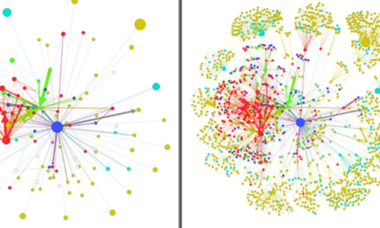
Final text of UK’s TPD transposition: online sales survive
22nd April 2016 - News analysis |
The British government has transposed the EU’s Tobacco Products Directive (TPD) with minimal additional restrictions, as predicted by ECigIntelligence.

The British government has transposed the EU’s Tobacco Products Directive (TPD) with minimal additional restrictions, as predicted by ECigIntelligence.

The future of retail channels in the Spanish e-cigarette market may hang in the balance as the government approaches a final decision on whether to prohibit online sales, according to a new ECigIntelligence report.

A new trade association for the e-cigarette industry in China plans to lobby local and national governments to improve the business environment.

A new study has shown some relation between e-cigarette point-of-sale (POS) advertising and youth uptake of e-cigs. But the authors urge people to not jump to conclusions because of the results.

With only weeks to go before the measures of the EU’s Tobacco Products Directive (TPD) start to come into legal effect, ECigIntelligence’s European regulatory analysts have identified the major tasks facing e-cigarette companies.

Consistent patterns in Website traffic could be a sign that the U.S. online e-cigarette sector is maturing, a new ECigIntelligence report suggests.

High pricing of e-cigarettes compared to combustibles could deter smokers from switching to vaping in many jurisdictions, a new study suggests.

Attempts to regulate e-cigarette advertising in some U.S. states are falling foul of constitutional law, a new ECigIntelligence in-depth report finds.

A new $50m youth anti-smoking campaign funded by American pharmacy chain CVS is to target e-cigarettes as well as conventional tobacco products.

Vape stores are helping revitalise Britain’s shopping streets, according to a new report.

There may be more recent ECigIntelligence reports on this territory. Please visit the home page for the United States or the advanced search page. Executive Summary In the U.S., there are laws in place to regulate misleading marketing claims, which apply to e-cigarettes. However, the advertising requirements related to tobacco products are much broader in scope – » Continue Reading.

Australia’s already stringent rules against e-cigarettes look set to get even tighter in some parts of the country, although there are tentative signs that the national regulatory framework could come under debate.

E-cigarettes will likely soon become legally equal to combustible products in California, following the state legislature’s approval of a raft of tobacco measures which also raise the smoking – and vaping – age to 21.

An operation by Trading Standards officers in the UK town of Plymouth found that 9 out of 15 retailers still sold e-cigarette products to customers under the age of 18.

Data for the online e-cig sector in the United States suggests a robust industry, and contrasts strongly with dwindling growth reported in traditional retail channels. Our in-depth report identifies the top vendors and analyses changes in leadership over time; looks at levels and drivers of traffic; and assesses key metrics for consumer engagement with online sellers of e-cigarettes and vapour products.

Analysis of new data from Nielsen in the UK shows how difficult it is to establish with certainty which companies are leading the e-cigarette industry.

A new study has shown that e-cig advertising, particularly on TV, has created an impression on smokers but has had little actual impact on e-cigarette uptake.

ECigIntelligence’s evaluation of the interconnected value chains in the U.S. e-cigarette and vapour markets begins with the overly saturated, intensely competitive, and highly lucrative e-liquid segment. This report takes an overview of 2015 Vape Shop Index findings on the top revenue-generating e-liquid brands sold through bricks-and-mortar retail locations across the U.S.

There may be more recent ECigIntelligence reports on this territory. Please visit the full list of regulatory reports, or the advanced search page. Executive summary
Tax is levied on e-cigs and e-liquid from 1st January 2016. Apart from taxation, e-cigarettes are mainly unregulated in Romania. From May 2016 onward, new legislation comes into place transposing the » Continue Reading.

Public-health authorities should monitor e-cigarette firms on social media more closely to prevent non-vapers being tempted into trying nicotine products, new research claims.

A London-based e-cigarette startup has received £235,000 ($340,000, €300,000) from angel investors which will help it expand from online to offline sales while maintaining its current subscription model.

E-liquid with nicotine is illegal in Germany, the supreme court has ruled, because it also contains other substances that the law does not allow to be mixed with tobacco products.

More vapour-related bills were introduced during the 2015 state legislative sessions than ever before, and ECigIntelligence expects even more vapour regulation to be proposed during the 2016 regular session. This report looks at the current regulatory situation across the U.S. in key areas such as manufacturing, labelling, advertising and marketing, public place usage, youth access and taxation, and forecasts the regulatory trends for 2016.

The latest in a series of regular reports from ECigIntelligence on the progress of vapour-related regulation in the U.S, focusing on the current sessions of state legislatures.

There may be more recent ECigIntelligence reports on this territory. Please visit the home page for the United States or the advanced search page. Executive summary When the deeming regulation is finalised, current good manufacturing practices (cGMP) for cigarettes will automatically apply to the vapour industry; this means e-cig manufacturers and distributors will immediately be subject to the Food » Continue Reading.

There may be more recent ECigIntelligence reports on this territory. Please visit the home page for Finland or the advanced search page. Introduction Nicotine-containing e-cigarettes, currently illegal in Finland unless a medical licence has been obtained, will become legal from May 2016 and be treated as tobacco-related products. Despite this liberalisation, however, prohibitions that threaten the development » Continue Reading.

TV ads seen by young people may lead them to start vaping later, researchers claim in a report which is likely to add further fuel to the debate over e-cigarette marketing – a debate where studies that detect an influence are garnering much more attention than those that suggest advertising is less effectual.

E-cigarette products containing nicotine cannot be sold in Japan without a pharmaceutical licence, and there appears to be little immediate likelihood of that changing. However, imports are tolerated and nicotine-free products can be sold. Our in-depth report on Japanese regulation examines the legal framework and specific legislation that constrains the e-cig market there.

E-cig retailers in the Greek capital Athens remain positive despite smaller stores struggling, with continuing growth giving some grounds for encouragement.

The latest in a series of regular reports from ECigIntelligence on the progress of vapour-related regulation in the U.S, focusing on the current sessions of state legislatures.

Denmark’s government has had second thoughts about imposing a strict, tobacco-style regime on vaping in public places. A new draft of wide-ranging legislation which will make e-cigarettes available as consumer products, transpose the European Union’s Tobacco Products Directive (TPD), and set a minimum purchase age of 18 as well as regulating public usage of e-cigs was put before the Danish » Continue Reading.

Germany is to ban menthol e-liquid as well as many other flavours when it transposes the EU’s Tobacco Products Directive (TPD).

One in eight French vape stores went out of business last year, continuing 2014’s trend of closures, but some areas of the country have been much harder hit than others.

The first in a series of regular reports from ECigIntelligence on the progress of vapour-related regulation in the U.S, focusing on the current sessions of state legislatures.

Introduction • Regulatory landscape • Current national regulatory framework • National regulatory framework post-TPD • Age restrictions • Product restrictions • Ingredients • Labelling and packaging • Product notification • Annual reporting • Vigilance • Retailing • Public usage • North Rhine-Westphalia • Bavaria • Baden-Württemberg • Lower Saxony • Hesse • Public usage: an inconsistent future? • Advertising and marketing • Taxation • Enforcement • Case law: e-cigarettes as medical products • Case law: e-cigarettes as tobacco products • Case law: tobacco advertising restrictions • The missing pieces from the TPD jigsaw • Graphic: how German e-cigarette regulation will change

Members of sexual minorities are far more likely than others to use e-cigarettes, according to a new U.S. study which also suggests that vaping is most popular among younger, less-educated, and lower-income groups.

As the advertising spend of U.S. e-cigarette suppliers escalates, they are continuing to use themes such as independence, rebellion and sex to sell their products – and their advertisements are prompting interest among the many young people who see them, according to a critical report from the Centers for Disease Control and Prevention (CDC). Yet some of the data relied upon by the CDC appears to raise questions of accuracy and relevance.

The shape of future e-cigarette regulation in the UK became clearer today with the release of the government’s response to one major public consultation, and the launch of another on the issue of fees.

E-cigarette retailers and vapers in the Chicago area will soon be faced with new taxes that could mean e-liquid prices more than double.

As we move into 2016, nearly half of the 28 member states of the European Union (EU) have made little apparent progress in transposing its Tobacco Products Directive (TPD) into their national law – despite the May 2016 deadline. Who has achieved the most, who is lagging behind, what remains to be done, and how do the regulatory approaches of the member states differ?

A selection of photos from Malaysian vape shops.

Medical licensing of an e-cigarette seems to have been decisive in swinging the favour of Britain’s pharmacists toward vaping.

Nine Democratic senators in the U.S. have urged a federal agency to investigate e-liquid sellers for deceptively advertising their products using recognisable brand names of candy, breakfast cereals and other foods and drinks.

This new infographic from ECigIntelligence illustrates the large untapped market for vapour products in Europe.

There may be more recent ECigIntelligence reports on this territory. Please visit the home page for France or the advanced search page. Executive summary
One of the largest e-cig markets, France has enacted regulations specific to e-cigarettes (inter alia, nicotine concentration, labelling and advertising); these regulations do not place an excessive burden on the industry and are not » Continue Reading.

There may be more recent ECigIntelligence reports on this territory. Please visit the home page for the United Kingdom or the advanced search page. ECigIntelligence’s Dan Irwin-Brown and Nikita Dzhain have compiled a fascinating report detailing the breadth of product available at UK online e-cigarette vendors, using a sample of over 1400 E-liquid products and more than 140 brands. Insight is given into » Continue Reading.

How much does regulating the e-cigarette industry cost? A new report in Wales gives insight into the bottom line.

A new report highlights the importance of seating and the creation of a “vape lounge” experience in U.S. vape stores.

This new infographic from ECigIntelligence examines the state of e-cigarette regulation and transposition of the EU Tobacco Products Directive (TPD) throughout the European Union.

The e-cigarette world in 2016 will be overshadowed by regulation. But the story will not just be about compliance. The market and the products themselves are rapidly evolving even without the influence of law-makers. So requirements like the TPD and the deeming regulations merely add a further twist to an already complex outlook.
Get 7 days of FREE platform access: Demo our data contents without commitment
"*" indicates required fields
Notifications